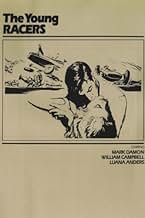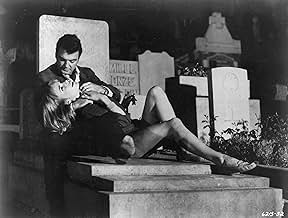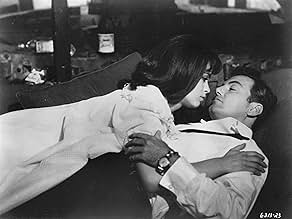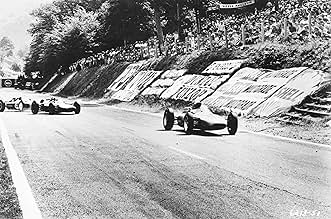AVALIAÇÃO DA IMDb
4,9/10
383
SUA AVALIAÇÃO
Adicionar um enredo no seu idiomaA former race car driver-turned-writer attempts to expose a ruthless, womanizing Grand Prix racer - who may actually be sensitive and misunderstood.A former race car driver-turned-writer attempts to expose a ruthless, womanizing Grand Prix racer - who may actually be sensitive and misunderstood.A former race car driver-turned-writer attempts to expose a ruthless, womanizing Grand Prix racer - who may actually be sensitive and misunderstood.
R. Wright Campbell
- Robert Machin
- (as Robert Campbell)
Margrete Robsahm
- Lea Anderson
- (as Margrete Robsahn)
Béatrice Altariba
- Monique
- (as Beatrice Altariba)
Jimmy Clark
- Self
- (não creditado)
Roger Corman
- Man outside Monaco Hotel
- (não creditado)
Bruce McLaren
- Self
- (não creditado)
Avaliações em destaque
A former race-car driver-turned-writer decides to expose a ruthless, womanizing Grand Prix race driver in a book. However, his scheme explodes when his life is saved by this man, who is actually sensitive and misunderstood.
While not Corman's best work, there is a good cast here with Mark Damon and uncredited voice-overs by William Shatner. The script was written by Robert Wright Campbell, who received an Academy Award nomination for his screenplay "Man of a Thousand Faces", the biography of Lon Chaney. Robert's brother William also stars in this alongside Damon. (William, interestingly, filmed "Dementia 13" immediately after this, under the guidance of Corman protégé Francis Ford Coppola, and also had some "Star Trek" appearances -- with Shatner!) William Campbell's ex-wife, Judith Exner, was notorious for having affairs with President Kennedy and two Chicago mobsters... but that is neither here nor there.
While not Corman's best work, there is a good cast here with Mark Damon and uncredited voice-overs by William Shatner. The script was written by Robert Wright Campbell, who received an Academy Award nomination for his screenplay "Man of a Thousand Faces", the biography of Lon Chaney. Robert's brother William also stars in this alongside Damon. (William, interestingly, filmed "Dementia 13" immediately after this, under the guidance of Corman protégé Francis Ford Coppola, and also had some "Star Trek" appearances -- with Shatner!) William Campbell's ex-wife, Judith Exner, was notorious for having affairs with President Kennedy and two Chicago mobsters... but that is neither here nor there.
Well, that's a terrible title. I mean, these people don't seem that young, but Roger Corman was trying to make movies for teenagers. So, selling to them the idea that it was about young people fit the bill. I mean, one lead was about 30 and the other was in his 40s. These aren't teenagers. I did coincidentally watch Patrick H. Willems' video essay about racing in film a couple of months before I watched The Young Riders, and Corman's propensity for frugality seemed to have led to something of a small breakthrough in cinema: filming real actors in real cars on real roads racing for real. That's neat. The rest of the movie, though? It's alright. A character piece without the right kind of structure or stakes to give it the dramatic push it needs to be actually interesting. Still, I appreciated it for trying to a limited degree.
Stephen Children (Mark Damon) is a former racecar driver in Monte Carlo to see the Grand Prix but also to meet his fiancée, Monique (Beatrice Altariba). Along with his secretary, Henny (Launa Anders), he waits in a café only to discover Monique having a public scene with the winner of the race, Joe Machin (William Campbell), with whom she'd been having an affair. Stephen decides that he's going to destroy Joe by getting close to him and writing a book to expose all of Joe's flaws to the world.
Where the film falters is in how it structures everything. The script by R. Wright Campbell is a slow moving character piece, but it spends so much time on Stephen getting to know and like Joe that any sense of tension at Stephen's hidden motive gets lost by the halfway point. At best, the film becomes this portrait of Joe, a man consumed by fear every time he gets in the cab of his car. However, how this relates to his womanizing seems intentionally obfuscated, like it was an attempt to create a complex character, but I just don't think the writing is quite there. It's an interesting attempt, but I wouldn't call it successful.
Where the film gets really weird structurally is in the introduction of Sir William Dragonet (Patrick Magee). He's brought in when the racing circuit reaches England, and the racers have lunch with him. He seems like just a rich fan of the game, but he ends up like Stephen. He has a personal grudge against Joe and wants to destroy him. When Stephen won't play Sir William's game, Sir William decides to reveal to Joe Stephen's original intention, opening up the rivalry between the two men.
And suddenly I saw what this movie should have been.
The two men were becoming friends as they progressed in races. Stephen ends up on a rival racing team early in the film, and they're out on the track multiple times. But the races are essentially just racing footage because Stephen is getting friendly with Joe before every race. There's little drama in the racing, until the finale. What if Stephen never hid his motive? What if his getting onto a rival racing team wasn't just something that happened to him because he decided to show off on a test lap but he forced his way on because he wanted to face down Joe on the track? It'd be closer to a generic racing movie, probably, but it'd have actual drama infusing its runtime instead of this leaden attempt at a character study.
The racing footage, though, is where the film is at its best. It's not always actually dramatic because of the story around it, but the fast moving cars, filmed from inside the cars themselves, is gripping if thin entertainment. When things do actually get dramatic for that final race in England, though, it's an extra layer on top that makes the event pop that much more.
So, the script, like many Corman films, needed another rewrite (Campbell wasn't a bad writer, and maybe he could have managed it himself). There's the production idea (race cars) and a script idea (the fearful athlete) that don't quite mesh as well as they should, but the actors are all game and do their best. It's always fun to see Trelane in something other than that one Star Trek episode.
It has some charms. It doesn't gel. It's far from the worst film Corman ever made, but it's also far from his best.
Stephen Children (Mark Damon) is a former racecar driver in Monte Carlo to see the Grand Prix but also to meet his fiancée, Monique (Beatrice Altariba). Along with his secretary, Henny (Launa Anders), he waits in a café only to discover Monique having a public scene with the winner of the race, Joe Machin (William Campbell), with whom she'd been having an affair. Stephen decides that he's going to destroy Joe by getting close to him and writing a book to expose all of Joe's flaws to the world.
Where the film falters is in how it structures everything. The script by R. Wright Campbell is a slow moving character piece, but it spends so much time on Stephen getting to know and like Joe that any sense of tension at Stephen's hidden motive gets lost by the halfway point. At best, the film becomes this portrait of Joe, a man consumed by fear every time he gets in the cab of his car. However, how this relates to his womanizing seems intentionally obfuscated, like it was an attempt to create a complex character, but I just don't think the writing is quite there. It's an interesting attempt, but I wouldn't call it successful.
Where the film gets really weird structurally is in the introduction of Sir William Dragonet (Patrick Magee). He's brought in when the racing circuit reaches England, and the racers have lunch with him. He seems like just a rich fan of the game, but he ends up like Stephen. He has a personal grudge against Joe and wants to destroy him. When Stephen won't play Sir William's game, Sir William decides to reveal to Joe Stephen's original intention, opening up the rivalry between the two men.
And suddenly I saw what this movie should have been.
The two men were becoming friends as they progressed in races. Stephen ends up on a rival racing team early in the film, and they're out on the track multiple times. But the races are essentially just racing footage because Stephen is getting friendly with Joe before every race. There's little drama in the racing, until the finale. What if Stephen never hid his motive? What if his getting onto a rival racing team wasn't just something that happened to him because he decided to show off on a test lap but he forced his way on because he wanted to face down Joe on the track? It'd be closer to a generic racing movie, probably, but it'd have actual drama infusing its runtime instead of this leaden attempt at a character study.
The racing footage, though, is where the film is at its best. It's not always actually dramatic because of the story around it, but the fast moving cars, filmed from inside the cars themselves, is gripping if thin entertainment. When things do actually get dramatic for that final race in England, though, it's an extra layer on top that makes the event pop that much more.
So, the script, like many Corman films, needed another rewrite (Campbell wasn't a bad writer, and maybe he could have managed it himself). There's the production idea (race cars) and a script idea (the fearful athlete) that don't quite mesh as well as they should, but the actors are all game and do their best. It's always fun to see Trelane in something other than that one Star Trek episode.
It has some charms. It doesn't gel. It's far from the worst film Corman ever made, but it's also far from his best.
One of producer / director Roger Cormans' exploitation-subculture flicks, "The Young Racers" is intended to take a look at the lives and personalities of those who make their living racing cars. Mark Damon plays Steve Children, a former racer turned writer who learns that champion driver Joe Machin (William Campbell) has used and discarded Steves' fiancee Monique (Beatrice Altariba). Aiming to get back at Joe (a flamboyantly arrogant, cocky type) somehow, Steve works his way into Joes' life, pretending that he's penning a novel and needs inspiration. But as time goes by, he learns more about Joe, realizing that this man who's come off as such a conceited pig is actually more sensitive and troubled than it appears.
Although there is some fairly intense, well-edited, and exciting racing action, "The Young Racers" is one of those racing dramas that spends more time off the track. It functions more as a character study. As written by Campbells' younger brother / fellow actor Robert (R. Wright) Campbell, it includes some good and interesting insight, if perhaps some overly grandiose dialogue. The main reason to watch "The Young Racers" is to watch an engaging cast fill out these roles. Damon (who's actually looped by none other than Bill Shatner!) and Campbell do a fine job, receiving strong support from a very attractive bunch of actresses. Luana Anders is front and centre as Steves' loyal secretary Henny, while Marie Versini makes the most of a compelling role as Joes' equally loyal wife Sesia. The great Patrick Magee pops up in the final quarter of the film to play a pivotal role.
As was often the case with Corman films, he paces it well enough so that it clocks in at roughly 80 minutes or so (although in his case it was always an economical decision). It's good entertainment with a jazzy score by Les Baxter, the prolific composer who contributed to a large number of A.I.P. exploitation features.
Among the technical crew: Francis Ford Coppola as the sound man, Menahem Golan as the property master, and longtime Corman colleague Charles Griffith as the assistant director.
Seven out of 10.
Although there is some fairly intense, well-edited, and exciting racing action, "The Young Racers" is one of those racing dramas that spends more time off the track. It functions more as a character study. As written by Campbells' younger brother / fellow actor Robert (R. Wright) Campbell, it includes some good and interesting insight, if perhaps some overly grandiose dialogue. The main reason to watch "The Young Racers" is to watch an engaging cast fill out these roles. Damon (who's actually looped by none other than Bill Shatner!) and Campbell do a fine job, receiving strong support from a very attractive bunch of actresses. Luana Anders is front and centre as Steves' loyal secretary Henny, while Marie Versini makes the most of a compelling role as Joes' equally loyal wife Sesia. The great Patrick Magee pops up in the final quarter of the film to play a pivotal role.
As was often the case with Corman films, he paces it well enough so that it clocks in at roughly 80 minutes or so (although in his case it was always an economical decision). It's good entertainment with a jazzy score by Les Baxter, the prolific composer who contributed to a large number of A.I.P. exploitation features.
Among the technical crew: Francis Ford Coppola as the sound man, Menahem Golan as the property master, and longtime Corman colleague Charles Griffith as the assistant director.
Seven out of 10.
This is one of only a handful of this director's films that I haven't seen. I've had more than enough experience, however, with those that heap great praise over Mr. Corman's work, most of which is junk, and all of which is flawed, at best. Take for example a home movie called "Little Shop Of Horrors", the original, not the musical (which came later). Although it is remembered with saccharine fondness by many, the movie, which was entirely created in 3 days, on a set which was leftover by another project that wrapped early, is possibly the worst film ever made. As for 1963's "The Young Racers", I stopped in and managed to read a comment on it, under the title, "a great little film". First of all, I seriously doubt it. But everyone's entitled to their opinion. Where the writer of the comment lost me was towards the end, where they bemoaned Corman's having had to resort to making, 'grade Z porno flicks' in the 70's. I don't know what Roger Corman this person is talking about, but it wasn't the one that directed this movie. Roger Corman, despite my limited taste for his output, NEVER made a grade Z porno flick, EVER. Seriously, if you're going to make a comment, do the bloody legwork and research what the hell you're talking about! How many clicks would it have taken to correct your ignorant statement? Your love or hate of his films are your own affair, but get the facts straight.
Early 1960's newfangled, fast, agile, sleek, clean-lined, independent suspension formula one racers streak across the screen in glorious color. High-pitched, hi-revving engines scream DANGER HERE! This film delivers the typical 1960s male adolescent fantasy desire for a fast beautiful car, fast high-living, and the same kind of woman. At film's beginning, the characters are presented as mere stereotypes. In movie westerns, William Campbell was often typecast as a somewhat erratic bad guy, and in this movie he starts off in type as a bad guy 20th century playboy driver. He is egotistical, ruthless, detestable, married to a beautiful woman but still enjoys controlling, using, then callously discarding woman after woman (as he says, "the kind I get"). Mark Damon plays a writer who is also a driver and fiancée of one of the discards. But Damon's revenge is complicated by a growing friendship with Campbell as they compete on the racing circuit. Without being too obscure or complicated, the movie allows the excitement, danger, conflict, and searing emotions to cut thru the drivers' facades and expose their inner drives and fears, like a Bowie knife can carve up a tin of Boston baked beans. The characters become more than and different from what we thought. We increasingly understand and sympathize with the "bad" guy as he struggles with his fears and tries to become his better self. The plot climaxes, then accelerates promptly to a plausible resolution that leaves you with a good feeling. Enough fast action for any classic auto fan. Enough human element to get past the action into hearts and minds of the drivers "and the women who love them" (sorry, could not avoid inserting that cliché). Fans wanting more dwelltime should see James Garner's thrilling 1966 film "Gran Prix."
Você sabia?
- CuriosidadesDue to on-set sound recording issues, most of the dialogue in the film had to be re-dubbed. All of Mark Damon's dialogue was looped by an uncredited William Shatner. Patrick Magee's dialogue was also looped by an uncredited actor.
- Erros de gravaçãoWhen the story shifts from Monaco, the inter-title before the next scene says Spa, Belgium and Robert and Sesia then meet in front of a church. The church is actually Notre Dame Cathedral in Rouen, France.
- ConexõesReferenced in Pulp Fiction: Tempo de Violência (1994)
Principais escolhas
Faça login para avaliar e ver a lista de recomendações personalizadas
Detalhes
Bilheteria
- Orçamento
- US$ 150.000 (estimativa)
- Tempo de duração1 hora 24 minutos
- Mixagem de som
- Proporção
- 1.66 : 1
Contribua para esta página
Sugerir uma alteração ou adicionar conteúdo ausente

Principal brecha
By what name was Desafiando a Morte (1963) officially released in Canada in English?
Responda






























